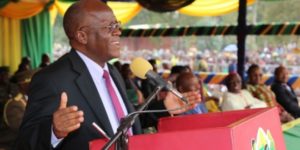by Angela Ilomo
Angela Ilomo is the Acting Director of RLabs Tanzania, a lawyer by profession, and is dedicated to transforming opportunities for young women and men through leading RLabs’ entrepreneurship programme. She takes over the Education portfolio in Tanzanian Affairs from Naomi Rouse. I offer my sincere thanks to both – The Editor.
Tanzania lifts ban on pregnant school girls
The law which was originally passed in 2002 was reinforced by late President John Magufuli in 2017 barring pregnant girls from attending regular school.
Speaking in Dodoma on Wednesday November 24, Prof. Ndalichako said the government will now allow all students who dropped out of school due to various reasons including pregnancy to return to school in a formal system after giving birth. “Later today, I will issue a statement explaining how the students who dropped out of school due to pregnancy and other reasons will go back to school,” she said.
US Ambassador Dr Donald Wright said his country was pleased by the Tanzanian move. “This proclamation indicates a more inclusive approach to education in Tanzania and a positive step forward for Tanzanians,” he said. (The Citizen, The Daily News)
Issues that are still pending in Tanzania’s education system
One of the major pending issues is the ‘dualism’ in primary education in Tanzania. This dualism plays out negatively and has, unfortunately, been accepted as a fait accompli. This has led to better performance of children studying in private school during final standard seven examination.
A major driving force in this dualism the difference in the medium of instruction: English and Kiswahili. Pupils learning in an English environment, from nursery school to Standard Seven acquire English proficiency that those schooled in the Kiswahili system can only dream of. If Tanzania’s secondary schooling and university education was not conducted entirely in English this would not have been such a problem.
Prof Herme Mosha cautioned 10 years ago, while giving an assessment of 50 years of independence, that the differences in performance in examinations between pupils in public and private schools might produce the ruling class from those studying in private schools and the ruled class from those studying in poorly equipped public schools.
When public schools become much better equipped and well-staffed with teachers with high morale, with healthy pupil-to-teacher ratio, then more parents will send their children to public schools, which might lead to the natural death of many of the many private schools. (The Citizen)
Over 900,000 set to start secondary education in 2022
This year, 2021, has been one for the goodwill of the government and the education sector as a whole. More than 900,000 pupils who passed the 2021 Primary School Leaving Examination (PSLE) will for the first time join Form One within the first selection window, thanks in part to funds from the International Monetary Fund (IMF) in October of $576 million that have facilitated construction of over 10,000 classrooms across the country.
For five consecutive years there have been challenges in selecting a pile of primary school leavers who sought slots in public secondary schools due to shortage of classrooms vis-à-vis demand for accommodation.
The Minister of State in the President’s Office – Regional Administration and Local Government, Ms Ummy Mwalimu, said that no selected pupil will have to sit on the floor in the constructed classrooms as the fund will also be used to support the making of 462,795 desks. (The Citizen)
Government commits to work with Camfed
The government has committed to work together with the Campaign for Female Education (Camfed) to explore the potential for scaling the Learner Guide Program across the government school system by ensuring children access relevant life and work skills in their education. Camfed, since its inception in 2005, made it possible for 8,000 marginalized boys and girls to attend primary school and 55,000 girls to attend secondary school.
The Learner Guide Program sees that young women who have experienced first-hand barriers to education receive support to return to their local schools as mentors and role models. Now they are working to keep more girls in their communities in school.
In view of this, the Deputy Permanent Secretary in the Ministry of Education, Science and Technology, Prof Caroline Nombo, said the programme should not only focus on girls and forget boys who also face challenges and need quick interventions that will encourage them to remain in school.
She noted that the initiative supports government key priorities including equitable access to education and providing education with relevant life and works skills that will provide youth with employment. (The Citizen)
Fresh concern over lecturer shortage in Tanzanian universities
Tanzania Commission for Universities (TCU) figures show that the number of university academic staff increased from 6,238 in 2019 to 7,187 in 2020. At the same time, student enrolment has increased by an average of 4.7% annually from 177,963 students in the 2017/18 academic year to 206,305 in 2020/21. In Education, Law, Medical and Health Sciences, Humanities and Arts as well as Business programmes, there are unsatisfactory ratios of students to lecturers.
Education stakeholders are of the view that if these factors are not looked into and dealt with accordingly, the quality of education in the country runs the risk of experiencing a calamitous drop. The reasons TCU banned 19 institutions of higher learning from admitting new students in the 2017/18 academic year, was due to the lack of relevant human resources. “Producing a PhD holder takes much time, and is very expensive as well. It can even take up to ten or twelve years to get one,” said Dr. Jabir, an education consultant.
It is suggested by experts that the government should create conducive environment for universities to develop relevant human resources. (The Citizen)

